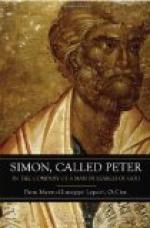“Precious few,” retorted Peter.
The other had nothing to say.
* * * * *
During these months Peter wrote often to Hilda, and with increasing frankness. Her replies grew shorter as his letters grew longer. It was strange, perhaps, that he should continue to write, but the explanation was not far to seek. It was by her that he gauged the extent of his separation from the old outlook, and in her that he still clung, desperately, as it were, to the past. Against reason he elevated her into a kind of test position, and if her replies gave him no encouragement, they at least served to make him feel the inevitableness and the reality of his present position. It would have been easy to get into the swim and let it carry him carelessly on—moderately easy, at any rate. But with Hilda to refer to he was forced to take notice, and it was she, therefore, that hastened the end. Just after Christmas, in a fit of temporary boldness, he told her about Louise, so that it was Louise again who was the responsible person during these months. Hilda’s reply was delayed, nor had she written immediately. When he got it, it was brief but to the point. She did not doubt, she said, but that what he had written was strictly true, and she did not doubt his honour. But he must see that their relationship was impossible. She couldn’t marry the man who appeared actually to like the company of such a woman, nor could she do other than feel that the end would seem to him as plain as it did to her, and that he would leave the Church, or at any rate such a ministry in it as she could share. She had told her people that she was no longer engaged in order that he should feel free, but she would ever remember the man as she had known him, whom she had loved, and whom she loved still.
It was in the afternoon that Peter got the letter, and he was just setting off for the hospital. When he had read it, he put on his cap and set off in the opposite direction. There was a walk along the sea-wall a few feet wide, where the wind blew strongly laden with the Channel breezes, and on the other side was a waste of sand and stone. In some places water was on both sides of the wall, and here one could feel more alone than anywhere else in the town.
Peter set off, his head in a mad whirl. He had felt that such a letter would come for weeks, but that did not, in a way, lessen the blow when it came. He had known, too, that Hilda was not to him what she had been, but he had not altogether felt that she never could be so again. Now he knew that he had gone too far to turn back. He felt, he could not help it, released in a sense, with almost a sense of exhilaration behind it, for the unknown lay before. And yet, since we are all so human, he was intensely unhappy below all this. He called to mind little scenes and bits of scenes: their first meeting; the sight of her in church as he preached; how she




